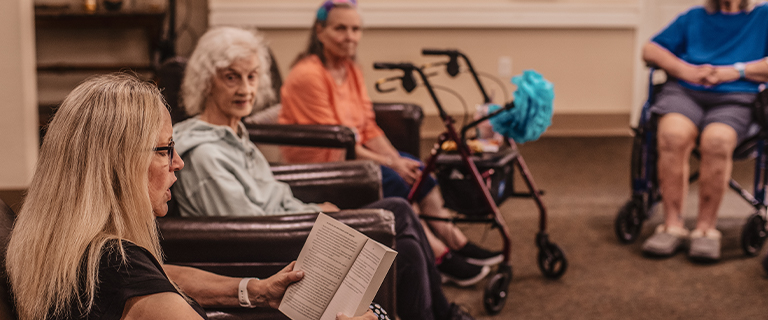Key Takeaways
- Occasional forgetfulness, like misplacing items, is a normal part of aging.
- Dementia involves consistent memory loss that disrupts daily life and affects problem-solving and reasoning.
- Early intervention can make a meaningful difference in managing the challenges that come with dementia.
Watching a loved one struggle with memory can be concerning. Maybe your mother misplaced her keys again, or your father forgot the name of a longtime neighbor. These moments spark a common worry: Is this normal aging, or something more serious?
Forgetfulness is a common part of aging, like occasionally misplacing items. Dementia, however, involves consistent memory loss that disrupts daily life and impacts problem-solving and reasoning. Recognizing the signs early can connect your family to the support, resources, and memory care needed to navigate these changes.
What Normal Forgetfulness Looks Like as You Age
Memory changes are a natural part of aging, much like graying hair or reading glasses. These typical memory lapses share several key characteristics that distinguish them from more serious concerns.
Occasional & Temporary
Normal forgetfulness happens now and then, not constantly. Your loved one might forget an appointment but remember it later, or struggle to recall a word during a conversation but find it minutes afterward. These memory slips can be frustrating but they are usually not serious or frequent.
Common examples include:
- Misplacing everyday items like glasses or car keys
- Forgetting the names of acquaintances or distant relatives
- Walking into a room and forgetting why
- Struggling to remember specific dates or details from recent conversations
Doesn’t Significantly Impact Daily Life
Most importantly, normal age-related forgetfulness doesn’t interfere with your loved one’s ability to live independently. They can still manage their finances, drive safely to familiar places, maintain personal hygiene, and handle household tasks. The memory lapses might be slightly inconvenient but don’t disrupt your overall day.
Understanding Mild Cognitive Impairment (MCI)
Mild cognitive impairment represents a middle ground between normal aging and dementia. People with MCI experience memory changes that are noticeable to themselves and others, yet they maintain their independence and daily functioning.
How MCI Differs from Dementia
While MCI involves more significant memory problems than normal aging, it doesn’t severely impact daily life like dementia does. Someone with MCI might forget recent conversations more frequently or have trouble following complex instructions, but they can still live independently and make their own decisions.
The key distinction is independence. MCI doesn’t rob people of their ability to care for themselves, manage their affairs, or maintain relationships.
What Is Dementia?

Dementia is an umbrella term for conditions that cause significant cognitive decline affecting memory, thinking, and daily functioning. Unlike normal forgetfulness or MCI, dementia progressively interferes with a person’s ability to live independently.
Progressive & Severe Memory Loss
Dementia-related memory problems go far beyond misplacing keys. They involve forgetting close family members, getting lost in familiar places, or being unable to recall recent events entirely. This memory loss can worsen over time, creating more challenges for both the person experiencing it and their family.
Significant Cognitive Decline Beyond Memory
While memory loss is often the most visible symptom, dementia affects many aspects of thinking and living. Your loved one might struggle with:
- Problem-solving and decision-making
- Language and communication
- Visual and spatial awareness
- Reasoning and judgment
- Personality changes
Impacts Daily Life Substantially
The hallmark of dementia is its interference with daily activities. Tasks that were once automatic become challenging or impossible. This might include difficulty managing medications, handling finances, preparing meals, or maintaining personal care.
The Importance of Early Intervention with Memory Loss
Recognizing memory changes early creates opportunities that wouldn’t exist later. Early intervention can slow progression, improve quality of life, and help families plan for the future while their loved one can still participate in important decisions.
Medical evaluation can also identify treatable causes of memory problems, such as vitamin deficiencies, medication interactions, or depression. Sometimes what appears to be dementia has a reversible cause.
How Memory Care Benefits Seniors with Early Memory Loss
At Parsons House Preston Hollow, we take a personalized approach to memory care, ensuring each resident receives support tailored to their unique journey. Our secure and thoughtfully designed environment promotes safety, comfort, and a sense of belonging.
- Supportive Spaces: Our community is designed to reduce confusion and help residents navigate their surroundings with confidence.
- 24/7 Safety & Care: Around-the-clock security and compassionate staff provide peace of mind for residents and families.
- Relationship-Focused Care: We get to know each resident’s life story, preferences, and needs to deliver truly individualized support.
- Engaging Programs: Meaningful activities stimulate cognitive function, promote joy, and create moments of connection.
We’re dedicated to enhancing the quality of life of people experiencing memory loss, helping them feel secure, valued, and supported every step of the way.
Taking the Next Step Forward
Distinguishing between normal forgetfulness and more serious memory concerns isn’t always straightforward, but understanding these differences empowers families to seek appropriate support when needed. Whether your loved one is experiencing typical age-related changes, MCI, or early dementia, resources and caring communities exist to help.
At Parsons House Preston Hollow, we understand that memory loss affects everyone differently. That’s why our memory care is built around the individual, with personalized care plans that focus on each resident’s needs, routines, and life story. Contact us today to learn how we can meet your loved one where they are and provide care that honors their dignity and enhances their daily life.



